反身代词搭配
反身代词常用固定词组归纳

反身代词常用固定词组归纳
摘要:
1.反身代词的定义与作用
2.反身代词的常见类型
3.反身代词的用法和搭配
4.反身代词在句中的位置
5.反身代词的注意事项
正文:
一、反身代词的定义与作用
反身代词是代词的一种,它表示动作的承受者与动作的执行者是同一个人或事物。
反身代词在句子中可以作主语、宾语、表语等成分。
通过使用反身代词,可以使句子更加简洁明了,同时也能起到强调的作用。
二、反身代词的常见类型
1.人称代词的反身形式:例如“我”的反身代词是“自己”,“你”的反身代词是“自己”,“他/她/它”的反身代词是“自己”。
2.物主代词的反身形式:例如“我的”反身代词是“我自己的”,“你的”反身代词是“你自己的”,“他的/她的/它的”反身代词是“他自己的/她自己的/它自己的”。
三、反身代词的用法和搭配
1.反身代词作主语:表示某人或某物自己怎么样。
例如:“我自己做了晚饭。
”
2.反身代词作宾语:表示某人或某物为自己怎么样。
例如:“请你自己拿一下。
”
3.反身代词作表语:表示某人或某物的状态或特征。
例如:“他病了,脸色很苍白。
”
四、反身代词在句中的位置
反身代词通常出现在句子的末尾,位于谓语动词之后。
但在一些特殊情况下,反身代词也可以出现在句子的其他位置。
五、反身代词的注意事项
1.使用反身代词时,要注意与“的”字结构进行区分。
例如:“我喜欢看书”中的“看”不能用反身代词“自己看”,应使用“的”字结构“我喜欢看书的”。
2.避免在一个句子中过度使用反身代词,以免造成语言累赘。
常用的与反身代词连用的动词搭配

常⽤的与反⾝代词连⽤的动词搭配 导语:英语中有许多常⽤的`与反⾝代词连⽤的动词搭配,下⾯是YJBYS店铺收集整理的常⽤的与反⾝代词连⽤的动词搭配,希望对你有帮助! absent oneself from 缺席 avail oneself of 利⽤ accustom oneself to 热⼼于 adapt oneself to 适应于 addict oneself in 沉溺于 address oneself to 着⼿ amuse oneself with (by) 以……⾃娱 apply oneself to 致⼒于 bethink oneself of 考虑 bend oneself to 热衷于 break oneself of 去掉……习惯 charge oneself with 承担 conceal oneself 藏⾝ concern oneself with 关⼼;忙于 confine oneself to 局限于 content oneself 满⾜ curl oneself up 卷曲着⾝⼦ deliver oneself of 说出 devote oneself to 致⼒于 distinguish oneself by 因……⽽出名 dress oneself in 穿着 engage oneself in 从事于 engage oneself to 同……订婚 enjoy oneself 过得愉快 excuse oneself 辩解 exert oneself 努⼒ familiarize oneself with 精通 flatter oneself ⾃认为 free oneself of 摆脱 give oneself to 热衷于 help oneself to 随意吃 indulge oneself in 沉迷于 lose oneself in ⼊迷 occupy oneself with 从事 oppose oneself to 反对 perfect oneself in 使⾃⼰精通(或⾮常了解) prepare oneself for 准备 present oneself at 出席 pride oneself on 以……⾃豪 remove oneself from 离开 resign oneself to 听任 revenge oneself on 报复 rid oneself to 除去 seat oneself in (on) 就座 throw oneself to 投⾝于。
反身代词用法
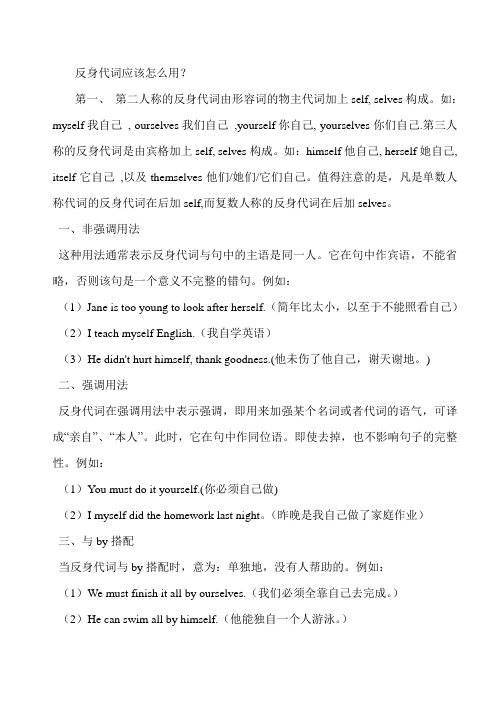
反身代词应该怎么用?第一、第二人称的反身代词由形容词的物主代词加上self, selves构成。
如:myself我自己, ourselves我们自己,yourself你自己, yourselves你们自己.第三人称的反身代词是由宾格加上self, selves构成。
如:himself他自己, herself她自己, itself它自己,以及themselves他们/她们/它们自己。
值得注意的是,凡是单数人称代词的反身代词在后加self,而复数人称的反身代词在后加selves。
一、非强调用法这种用法通常表示反身代词与句中的主语是同一人。
它在句中作宾语,不能省略,否则该句是一个意义不完整的错句。
例如:(1)Jane is too young to look after herself.(简年比太小,以至于不能照看自己)(2)I teach myself English.(我自学英语)(3)He didn't hurt himself, thank goodness.(他未伤了他自己,谢天谢地。
)二、强调用法反身代词在强调用法中表示强调,即用来加强某个名词或者代词的语气,可译成“亲自”、“本人”。
此时,它在句中作同位语。
即使去掉,也不影响句子的完整性。
例如:(1)You must do it yourself.(你必须自己做)(2)I myself did the homework last night。
(昨晚是我自己做了家庭作业)三、与by搭配当反身代词与by搭配时,意为:单独地,没有人帮助的。
例如:(1)We must finish it all by ourselves.(我们必须全靠自己去完成。
)(2)He can swim all by himself.(他能独自一个人游泳。
)一、反身代词的基本形式反身代词是oneself根据所指词的人称、性别、单复数等的变化可以有myself, himself, herself, yourself, itself, ourselves, yourselves, themselves 等形式。
反身代词用法汇总
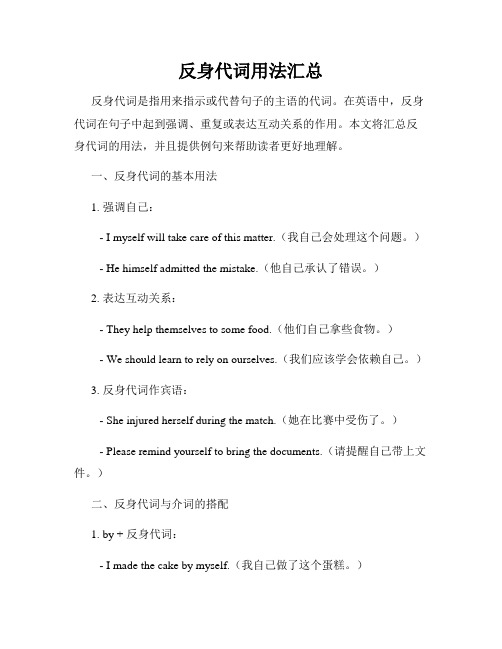
反身代词用法汇总反身代词是指用来指示或代替句子的主语的代词。
在英语中,反身代词在句子中起到强调、重复或表达互动关系的作用。
本文将汇总反身代词的用法,并且提供例句来帮助读者更好地理解。
一、反身代词的基本用法1. 强调自己:- I myself will take care of this matter.(我自己会处理这个问题。
) - He himself admitted the mistake.(他自己承认了错误。
)2. 表达互动关系:- They help themselves to some food.(他们自己拿些食物。
)- We should learn to rely on ourselves.(我们应该学会依赖自己。
)3. 反身代词作宾语:- She injured herself during the match.(她在比赛中受伤了。
)- Please remind yourself to bring the documents.(请提醒自己带上文件。
)二、反身代词与介词的搭配1. by + 反身代词:- I made the cake by myself.(我自己做了这个蛋糕。
)- He resolved the issue by himself.(他自己解决了这个问题。
)2. with + 反身代词:- She finished the project with herself as the leader.(她作为领导完成了这个项目。
)- They celebrated the victory with themselves in mind.(他们庆祝胜利,考虑到自己。
)三、反身代词作为表达身份与有限制的动词的宾语1. 某些动词:enjoy, hurt, pride, relax, concentrate等- She enjoyed herself at the party.(她在派对上玩得开心。
反身代词用法汇总
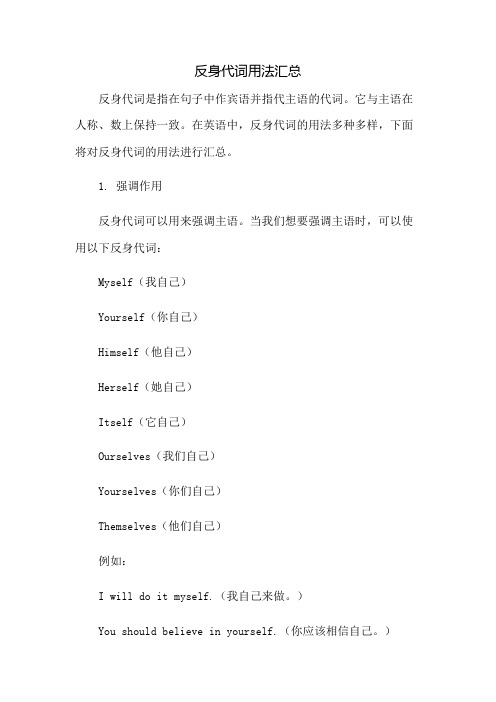
反身代词用法汇总反身代词是指在句子中作宾语并指代主语的代词。
它与主语在人称、数上保持一致。
在英语中,反身代词的用法多种多样,下面将对反身代词的用法进行汇总。
1. 强调作用反身代词可以用来强调主语。
当我们想要强调主语时,可以使用以下反身代词:Myself(我自己)Yourself(你自己)Himself(他自己)Herself(她自己)Itself(它自己)Ourselves(我们自己)Yourselves(你们自己)Themselves(他们自己)例如:I will do it myself.(我自己来做。
)You should believe in yourself.(你应该相信自己。
)He fixed the car himself.(他亲自修理了那辆车。
)2. 反身动词反身代词也可以与一些特定的动词搭配使用,这些动词需要带上反身代词来表示动作的反身性质。
一些常见的反身动词有:Enjoy(享受)Hurt(伤害)Help(帮助)Behave(表现)Apply(适用)Avl(有益于)Present(呈现)Prove(证明)例如:She enjoys herself at the party.(她在派对上玩得很开心。
)Be careful not to hurt yourself.(小心不要伤到自己。
)I can't do it myself, please help me.(我一个人做不了,帮帮我。
)3. 不可省略的反身代词在某些情况下,反身代词是不可省略的,即使其在句子中作宾语的角色。
这种情况包括以下几种:在句子中没有其他宾语时,反身代词不可省略。
反身代词用于表示特殊意义时,不可省略。
反身代词用于表示强调时,不可省略。
例如:I can take care of myself.(我能照顾好自己。
)He blamed himself for the flure.(他为失败而责备自己。
)She herself cooked the dinner.(她亲自做了晚餐。
反身代词搭配)
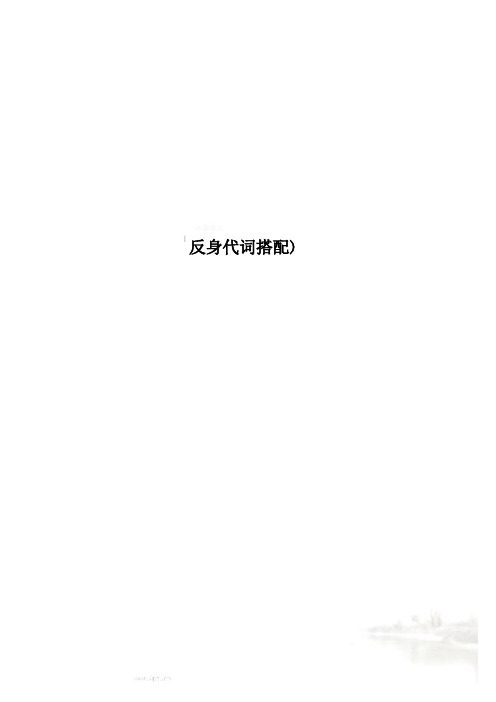
反身代词搭配)dress oneself 自己穿衣come to oneself 恢复知觉devote oneself 致力于enjoy oneself 过的快活excuse oneself 为自己辩解explain oneself 说明自己的意图feel /be oneself 觉得正常forget oneself 忘我、失态help oneself to 随便吃、随便用make youself at home 不受约束say to oneself 心里想seat oneself 坐下talk/speak to oneself 自言自语teach oneself 自学be oneself (人)处于正常状态by oneself 独自地; 单独地come to oneself 苏醒过来; 醒悟过来; 恢复理性for oneself 为自己; 代表自己; 独力地; 亲自地in spite of oneself 不知不觉地of oneself 独自; 自发地speak to oneself 自言自语dress oneself 穿衣wash oneself 洗澡teach oneself 自修conduct \behave oneself注意行为abandon oneself to 放纵的反身代词构成固定搭配大全反身代词是指myself, ourselves, yourself, yourselves, himself, herself, itself, themselves, oneself。
通常有强调性用法和非强调性用法。
一. 强调性用法:反身代词用于强调时经常作主语或宾语的同位语,一般置于所强调的词的后面;但如果不影响理解,作同位语的反身代词其位置比较灵活。
反身代词用于强调时要重读。
例:The manager himself served the customers.The manager served the customers himself. 经理亲自为顾客服务。
反身代词用法汇总

反身代词构成固定搭配大全反身代词是指myself, ourselves, yourself, yourselves, himself,herself, itself, themselves, oneself。
通常有强调性用法和非强调性用法。
用法:一、反身代词的基本形式反身代词是oneself根据所指词的人称、性别、单复数等的变化可以有myself, himself, herself, yourself, itself, ourselves, yourselves, themselves 等形式。
二、oneself与himself当one指人时,其相应的反身代词通常用oneself, 在美国英语中也可用himself:One should not praise oneself [himself]. 一个人不应该自吹自擂。
三、反身代词的句法功能:1. 用作同位语(加强被修饰词的语气,紧放在被修饰名词后, 或句末):The box itself is not so heavy. 箱子本身并不重。
herself is a lawyer. 布莱克太太本人就是一名律师。
You had better ask the driver himself. 你最好问司机本人。
Martin himself attended the sick man. 马丁亲自照顾病人。
Don’t trouble to come over yourself. 你不必费神亲自来了。
You yourself said so. / You said so yourself. 你自己是这样说的。
Never leave to others what you ought to do yourself. 不要把自己该做的事留给别人做。
2. 用作宾语(动词或介词的宾语):Take good care of yourself. 好好照顾你自己。
He has a right to decide for himself. 他有权为自己做出决定。
反身代词的用法

反身代词的用法1.反身代词做同位语反身代词做同位语,用来加强名词或者代词的语气,通常跟在名词、代词之后,有时也可位于句尾。
The boss himself answered the phone,not his secretary.You’d better ask the doctor himself about itI cook it myself.=I myself cook it.2、反身代词与其他词语搭配构成固定短语You’ll have to see if he has come for youself.你得亲自去看看他是否已经来了。
The computer can shut off by itself.这台计算机会自动关机。
You shouldn’t leave the child by himself at home.你不该把孩子独自一人留在家。
When he came to himself,he was lying down alone in the dark.他醒来时,发现自己一个人躺在黑暗中。
常用固定搭配for oneself 亲自dress oneself 自己穿衣in oneself本身固有的devote oneself to致力于help oneself to随便吃,随便用say to oneself心里想talk/speak to oneself自言自语by oneself独自of onesflf自动的cone to oneself恢复知觉enjoy oneself玩得高兴make oneself at home不受拘束seat oneself坐下teach oneself自学不用反身代词得情况1、做主语时不用反身代词Herself called you up last night.(错)She called you up last night herself(对)Myself drove the car(错)I myself drove the car.(对)注意:在and、or、nor连接得并列主语中,第二个主语可用反身代词,尤其是myself。
高中英语 反身代词构成固定搭配大全
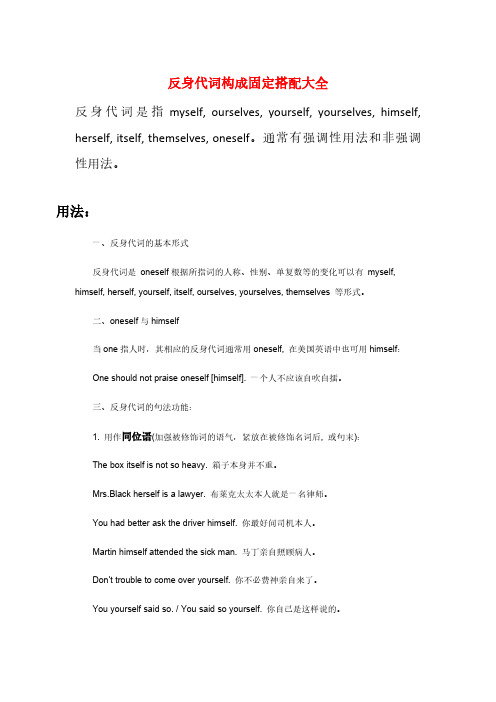
反身代词构成固定搭配大全反身代词是指myself, ourselves, yourself, yourselves, himself, herself, itself, themselves, oneself。
通常有强调性用法和非强调性用法。
用法:一、反身代词的基本形式反身代词是oneself根据所指词的人称、性别、单复数等的变化可以有myself, himself, herself, yourself, itself, ourselves, yourselves, themselves 等形式。
二、oneself与himself当one指人时,其相应的反身代词通常用oneself, 在美国英语中也可用himself:One should not praise oneself [himself]. 一个人不应该自吹自擂。
三、反身代词的句法功能:1. 用作同位语(加强被修饰词的语气,紧放在被修饰名词后, 或句末):The box itself is not so heavy. 箱子本身并不重。
Mrs.Black herself is a lawyer. 布莱克太太本人就是一名律师。
You had better ask the driver himself. 你最好问司机本人。
Martin himself attended the sick man. 马丁亲自照顾病人。
Don’t trouble to come over yourself. 你不必费神亲自来了。
You yourself said so. / You said so yourself. 你自己是这样说的。
Never leave to others what you ought to do yourself. 不要把自己该做的事留给别人做。
2. 用作宾语(动词或介词的宾语):Take good care of yourself. 好好照顾你自己。
反身代词的使用方法
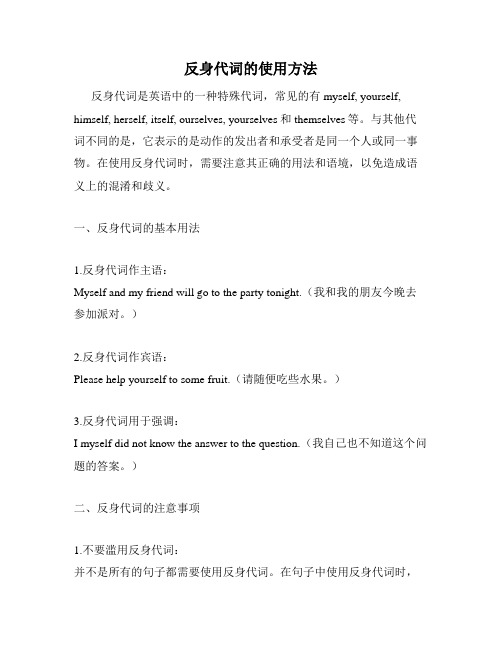
反身代词的使用方法反身代词是英语中的一种特殊代词,常见的有myself, yourself, himself, herself, itself, ourselves, yourselves和themselves等。
与其他代词不同的是,它表示的是动作的发出者和承受者是同一个人或同一事物。
在使用反身代词时,需要注意其正确的用法和语境,以免造成语义上的混淆和歧义。
一、反身代词的基本用法1.反身代词作主语:Myself and my friend will go to the party tonight.(我和我的朋友今晚去参加派对。
)2.反身代词作宾语:Please help yourself to some fruit.(请随便吃些水果。
)3.反身代词用于强调:I myself did not know the answer to the question.(我自己也不知道这个问题的答案。
)二、反身代词的注意事项1.不要滥用反身代词:并不是所有的句子都需要使用反身代词。
在句子中使用反身代词时,需要确认其使用是否符合语法和语义的要求,避免使用不当或滥用导致歧义。
2.不要与其他动词搭配使用反身代词:某些动词不需要与反身代词一起使用,如:enjoy, appreciate, hurt, kill, hang等。
如果使用反身代词,可能会导致句子的语义不清或产生歧义。
3.不要混淆反身代词和普通代词:反身代词只适用于动作的发出者和承受者是同一个人或同一事物的情况。
如果使用错误的代词,会导致句子的意思和表达方式发生变化,产生误解。
三、反身代词的实际运用1.在对话中使用反身代词可以使语言更为自然和易懂,并起到与对方打成一片的效果。
2.在写作中使用反身代词可以使文章表述更为准确和精练,同时也可以展现出作者对语言运用的娴熟程度。
3.在口语和书面语中,反身代词的使用可能存在区别。
在口语中,反身代词的使用率相对较高,而在书面语中则需根据具体情况进行选择。
高中英语反身代词构成固定搭配大全
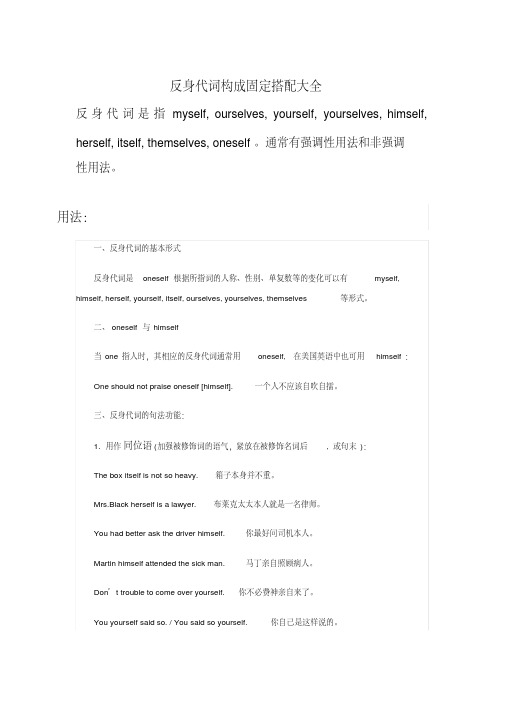
My brother and myself went there yesterday.
昨天我兄弟和我一起去了那儿。
Jim ’ s sister and himself get up at six every day. 吉姆的妹妹和他每天 6 点起床。
He was as anxious as myself. 他和我一样担心。
I accepted the offer before I was able to collect myself. 我还没来得 及考虑一下 ,就接受了帮助。
(7)help oneself 自用,自取所需
Please help yourself to enjoy the food. 请随便吃。 2.有时 “ 动词 +反身代词 ”之后 ,还需要一定的 +介词,构成固定 搭配。
她不能使别人听懂她的话。
Everybody here has the influenza including myself.
包括我在内所有人都患上流感。
The child cried himself to sleep. 孩子哭着哭着睡着了。
She convinced herself that it was so.
反身代词构成固定搭配大全
反 身 代 词 是 指 myself, ourselves, yourself, yourselves, himself, herself, itself, themselves, oneself 。通常有强调性用法和非强调 性用法。
用法:
一、反身代词的基本形式
反身代词是 oneself 根据所指词的人称、性别、单复数等的变化可以有
myself,
himself, herself, yourself, itself, ourselves, yourselves, themselves
反身代词用法汇总

反身代词组成固定搭配大全反身代词是指myself, ourselves, yourself, yourselves, himself, herself, itself, themselves, oneself。
往常有重申性用法和非重申性用法。
用法:一、反身代词的基本形式反身代词是oneself 依据所指词的人称、性别、单复数等的变化能够有myself, himself, herself, yourself, itself, ourselves, yourselves, themselves等形式。
二、 oneself 与 himself当 one 指人时,其相应的反身代词往常用oneself,在美国英语中也可用himself :One should not praise oneself [himself].一个人不该当自吹自擂。
三、反身代词的句法功能:1. 用作同位语 (增强被修饰词的语气,紧放在被修饰名词后, 或句末 ):The box itself is not so heavy.箱子自己其实不重。
Mrs.Black herself is a lawyer.布莱克太太自己就是一名律师。
You had better ask the driver himself.你最好问司机自己。
Martin himself attended the sick man.马丁亲身照料病人。
Don’ t trouble to come over yourself.你不用劳神亲身来了。
You yourself said so. / You said so yourself.你自己是这样说的。
Never leave to others what you ought to do yourself.不要把自己该做的事留给他人做。
2.用作宾语 (动词或介词的宾语 ):Take good care of yourself.好好照料你自己。
反身代词用法汇总

反身代词构成固定搭配大全反身代词是指myself, ourselves, yourself, yourselves, himself, herself, itself, themselves, oneself。
通常有强调性用法和非强调性用法。
用法:一、反身代词的基本形式反身代词是oneself根据所指词的人称、性别、单复数等的变化可以有myself, himself, herself, yourself, itself, ourselves, yourselves, themselves 等形式。
二、oneself与himself当one指人时,其相应的反身代词通常用oneself, 在美国英语中也可用himself:One should not praise oneself [himself]. 一个人不应该自吹自擂。
三、反身代词的句法功能:1. 用作同位语(加强被修饰词的语气,紧放在被修饰名词后, 或句末):The box itself is not so heavy. 箱子本身并不重。
Mrs.Black herself is a lawyer. 布莱克太太本人就是一名律师。
You had better ask the driver himself. 你最好问司机本人。
Martin himself attended the sick man. 马丁亲自照顾病人。
Don’t trouble to come over yourself. 你不必费神亲自来了。
You yourself said so. / You said so yourself. 你自己是这样说的。
Never leave to others what you ought to do yourself. 不要把自己该做的事留给别人做。
2. 用作宾语(动词或介词的宾语):Take good care of yourself. 好好照顾你自己。
反身代词的常见搭配
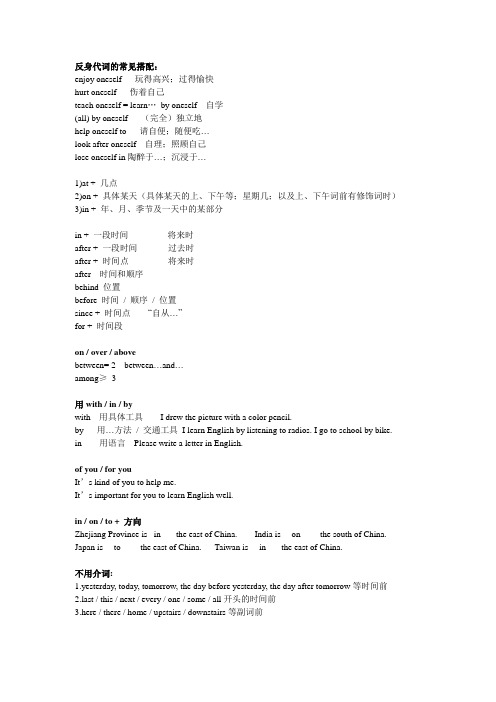
反身代词的常见搭配:enjoy oneself 玩得高兴;过得愉快hurt oneself 伤着自己teach oneself = learn…by oneself 自学(all) by oneself (完全)独立地help oneself to 请自便;随便吃…look after oneself 自理;照顾自己lose oneself in陶醉于…;沉浸于…1)at + 几点2)on + 具体某天(具体某天的上、下午等;星期几;以及上、下午词前有修饰词时)3)in + 年、月、季节及一天中的某部分in + 一段时间将来时after + 一段时间过去时after + 时间点将来时after 时间和顺序behind 位置before 时间/ 顺序/ 位置since + 时间点“自从…”for + 时间段on / over / abovebetween= 2 between…and…among≥3用with / in / bywith 用具体工具I drew the picture with a color pencil.by 用…方法/ 交通工具I learn English by listening to radios. I go to school by bike. in 用语言Please write a letter in English.of you / for youIt’s kind of you to help me.It’s important for you to learn English well.in / on / to + 方向Zhejiang Province is _in___ the east of China. India is __on____ the south of China. Japan is __to____ the east of China. Taiwan is __in___ the east of China.不用介词:1.yesterday, today, tomorrow, the day before yesterday, the day after tomorrow等时间前st / this / next / every / one / some / all开头的时间前3.here / there / home / upstairs / downstairs等副词前across(穿过) go across = crossby (乘坐) go to…by bus = take the bus to…for(支持) be foragainst(反对)be againstover(结束)be overpast(经过),go pastthrough(通过)go through(1)介词与动词的搭配listen to , laugh at, get to, look for;wait for, hear from, turn on, turn off, worry about, think of, look after, spend…on…, prefer…to…等。
[实用参考]反身代词用法汇总
![[实用参考]反身代词用法汇总](https://img.taocdn.com/s3/m/089b3c0e87c24028915fc356.png)
反身代词构成固定搭配大全反身代词是指mPself,ourselves,Pourself,Pourselves,himself,herself,itself,themselve s,oneself。
通常有强调性用法和非强调性用法。
用法:一、反身代词的基本形式反身代词是oneself根据所指词的人称、性别、单复数等的变化可以有mPself,himself,herself,Pourself,itself,ourselves,Pourselves,themselves等形式。
二、oneself与himself当one指人时,其相应的反身代词通常用oneself,在美国英语中也可用himself:Oneshouldnotpraiseoneself[himself].一个人不应该自吹自擂。
三、反身代词的句法功能:1.用作同位语(加强被修饰词的语气,紧放在被修饰名词后,或句末):TheboGitselfisnotsoheavP.箱子本身并不重。
Mrs.BlackherselfisalawPer.布莱克太太本人就是一名律师。
Pouhadbetteraskthedriverhimself.你最好问司机本人。
Martinhimselfattendedthesickman.马丁亲自照顾病人。
Don’ttroubletocomeover Pourself.你不必费神亲自来了。
PouPourselfsaidso./PousaidsoPourself.你自己是这样说的。
NeverleavetootherswhatPououghttodoPourself.不要把自己该做的事留给别人做。
2.用作宾语(动词或介词的宾语):TakegoodcareofPourself.好好照顾你自己。
Hehasarighttodecideforhimself.他有权为自己做出决定。
Hemadenocomplaintforhimself.他没为自己抱怨什么。
反身代词构成固定搭配精讲

反身代词构成固定搭配一、强调性用法:反身代词用于强调时经常作主语或宾语的同位语,一般置于所强调的词的后面;但如果不影响理解,作同位语的反身代词其位置比较灵活。
(1)反身代词用于强调时要重读。
The manager himself served the customers./I told them I wanted to see the manager himself.(2)在but, except, like, as,for 等词之后,或作对比时,宾格和反身代词都可以用,但后者的语气更强For my wife and me / myself it was a most enjoyable weekend. /She is about the same age as you / yourself. (3)反身代词作介词宾语或动词宾语时,有时也可起强调作用。
He has been living by himself since his parents died.This matter is between ourselves./She finished the job by herself. (by herself = without help)(4)反身代词作表语时也可表示特殊意义。
I am not quite myself today.二、非强调性用法:反身代词作动词宾语时常常是非强调性的。
(1)有些动词与反身代词成为固定搭配,请注意,汉译时“自己”多不译出。
1.behave oneself 有礼貌;规矩:Behave yourself while I am away.2. enjoy oneself 过得快活:We all enjoyed ourselves in the party.3.express oneself 表达自己的意思:He expressed himself satisfied.4. present oneself 到场;present itself出现He presented himself for a checkup at the hospital.他到医院接受体格检查。
反身代词的用法

2.反身代词还常和for ,of, in ,by 等介词搭配,构成固定短语。
• for oneself 独自地 of oneself 自动地 • in oneself 本身固有 by oneself 独自 • Think for yourself and you’ll get the answer.独立 思考一下,你可以找到答案。 • The computer can shut off of itself .计算计会自动 关闭。 • Jim is not bad in himself ,but he is a little shy.吉 姆本人并不坏,他就是有点害羞。 • You shouldn’t leave the child by himself at home .你不应该把孩子独自留在家里。(by himself 独自,相当于alone 。)
• 1.反身代词作同位语,用来加 强名词或代词的语气,表示 “由自己”、“亲自”、“本 人”等意思。通常跟在名词、 代词之后,但也可位 want the manger himself ,not his secretary .我要见经理本人, 而不是他的秘书。 • He worked out the problem himself .他自己做出了那道题目。
- 1、下载文档前请自行甄别文档内容的完整性,平台不提供额外的编辑、内容补充、找答案等附加服务。
- 2、"仅部分预览"的文档,不可在线预览部分如存在完整性等问题,可反馈申请退款(可完整预览的文档不适用该条件!)。
- 3、如文档侵犯您的权益,请联系客服反馈,我们会尽快为您处理(人工客服工作时间:9:00-18:30)。
conduct \behave oneself注意行为abandon oneself to 放纵的反身代词构成固定搭配大全反身代词是指myself, ourselves, yourself, yourselves, himself, herself, itself, themselves, oneself。
通常有强调性用法和非强调性用法。
一. 强调性用法:反身代词用于强调时经常作主语或宾语的同位语,一般置于所强调的词的后面;但如果不影响理解,作同位语的反身代词其位置比较灵活。
反身代词用于强调时要重读。
例:The manager himself served the customers.The manager served the customers himself. 经理亲自为顾客服务。
I told them I wanted to see the manager himself. 我告诉他们我要见经理本人。
在but, except, like, as,for 等词之后,或作对比时,宾格和反身代词都可以用,但后者的语气更强。
例:For my wife and me / myself it was a most enjoyable weekend. 对于我妻子和我(本人)来说,这是一个非常快乐的周末。
She is about the same age as you / yourself. 她的年龄和你(本人)差不多。
反身代词作介词宾语或动词宾语时,有时也可起强调作用。
例: He has been living by himself since his parents died. 他父母死后,他就一直一个人生活。
(by himself = alone)This matter is between ourselves.(without anyone else knowing)She finished the job by herself. 她独自完成了这项工作。
(by herself = without help)反身代词作表语时也可表示特殊意义。
例:I am not quite myself today. 今天我身体不舒服。
(=I am not feeling so well as I usually do)二.非强调性用法反身代词作动词宾语时常常是非强调性的。
有些动词与反身代词成为固定搭配,请注意,汉译时“自己”多不译出。
例:1. behave oneself 有礼貌;规矩He behaves himself well.他为人很好。
Behave yourself while I am away.我不在,你要规矩点。
2. enjoy oneself 过得快活We all enjoyed ourselves in the party.我们在聚会上都玩得很痛快。
3. express oneself 表达自己的意思Can you express yourself in English? 你能用英语表达思想吗?He expressed himself satisfied.他表示满意。
4. present oneself 到场;present itself出现He presented himself for a checkup at the hospital.他到医院接受体格检查。
When the cave door was unlocked, a sorrowful sight presented itself。
山洞门一打开,就出现了一幅悲惨的景象。
5. reveal itself 出现Gradually sounds multiplied and life revealed itself.声音渐渐多起来,生活又开始了。
6. collect oneself 清醒过来,镇定下来I accepted the offer before I was able to collect myself. 我还没来得及考虑一下,就接受了帮助。
7. help oneself有时“动词+反身代词”之后,还需要一定的介词。
例:8. busy oneself with 忙于He busied himself with numerous tasks around the house. 他忙于家里的许多事情。
9. avail oneself of 利用We availed ourselves of every chance to speak English.我们利用每个机会讲英语。
10. address oneself to 专心于(工作)They address themselves to the main difficulties.他们专心致志解决主要困难。
11. devote oneself to 致力于;献身于We are determined to devote ourselves to the cause of education. 我们决心为教育事业献身。
有些动词接反身代词后再接that从句:12. assure oneself that... 确信Before going to bed, she assure herself that the door was locked. 她确信门已锁好才去睡觉。
13. flatter oneself that ... 自以为He flattered himself that he would win the first prize. 她自以为会获得第一名。
二、by onself, of oneself, for oneself, to oneself“介词+反身代词”词组在阅读中经常碰到,由于理解不够准确,常常造成阅读理解的障碍,因此,有必要加以举例说明。
1. by oneself"单独地,独自地''1) They made the model machines all by themselves.2) You can complete the task by yourself .2. of oneself''自行地''1) The fire died of itself.2) The baby woke up of himself all ofa sudden.3. for oneself''亲自,为自己''1) Do you have anying to say for yourself?2) One cannot do such a thing for oneself.4. to oneself含有“暗自(在心中)的意思,常与动词 think,say, talk, tell等连用。
1) The boy said to himself."I must study hard.''2) This dictionary is used to himself.根据以上例句,我们可以看出:by oneself主要含义为''独自,自个儿、亲自'',没有别人帮助,相当于alone;of oneself是指不受外界事物干涉而自行完成的动作,常用在不及物动词之后;for oneself一般表示“为自己”的意思;to oneself则强度调“供某人独自用”和“暗自”的含义。
英语中反身代词与不同的介词搭配,可构成意义不同的习惯用语,学习者对如何选用这些习语感到困难。
其实,这些习惯用语的意义往往与介词的意义有联系,一旦见多了,对每个习语所表达的意思和所使用的语境便熟悉了,用起来就不会感到困难。
现将这类习惯用语分述如下:1. (all ) by oneself"单独地,独自地''“靠自己地”( alone or independently)。
1) They made the model machines all by themselves.2) You can complete the task by yourself.3)She did it all by herself.这件事是她独立完成的。
4)The little girl wrote the letter all by herself.那封信是小女孩独自写成的。
5)She likes to take a walk by herself.她喜欢独自散步。
6)The house stands all by itself on the hill.那所房子孤零零地耸立在山顶上。
7)His father lives by himself in the village.他的父亲独自一个人住在村里。
8)All his friends have deserted him and he is all by himself now.他所有的朋友都离弃他,现在他孤独一人。
(by oneself主要含义为''独自儿、亲自'',没有别人帮助,相当于alone;of oneself是指不受外界事物干涉而自行完成的动作,常用在不及物动词之后)2. of oneself''自行地'' 自发,自动,自然而然,“自然地”、“自发地”、“自动地”(of one's own accord)。
1) The fire died of itself.2) The baby woke up of himself all of a sudden.3)You need not call him;he will wake up of himself,他不必叫他,他自己会醒的。
4)The enemy will not perish of himself.敌人不会自行消灭。
5)The fire went out of itself.火是自己熄灭的。
6)Every day I awake of myself at half past five.每天早上我都是五点半就自己醒来。
7)The door opened of itself.门是自己开的。
8)The fire went out of itself.火自己熄灭了。
3. for oneself ''亲自,为自己,代表自己' ;独自地1) Do you have anying to say for yourself?2) One cannot do such a thing for oneself. 3)He kept the book for himself.他把这本书留给自己用。
